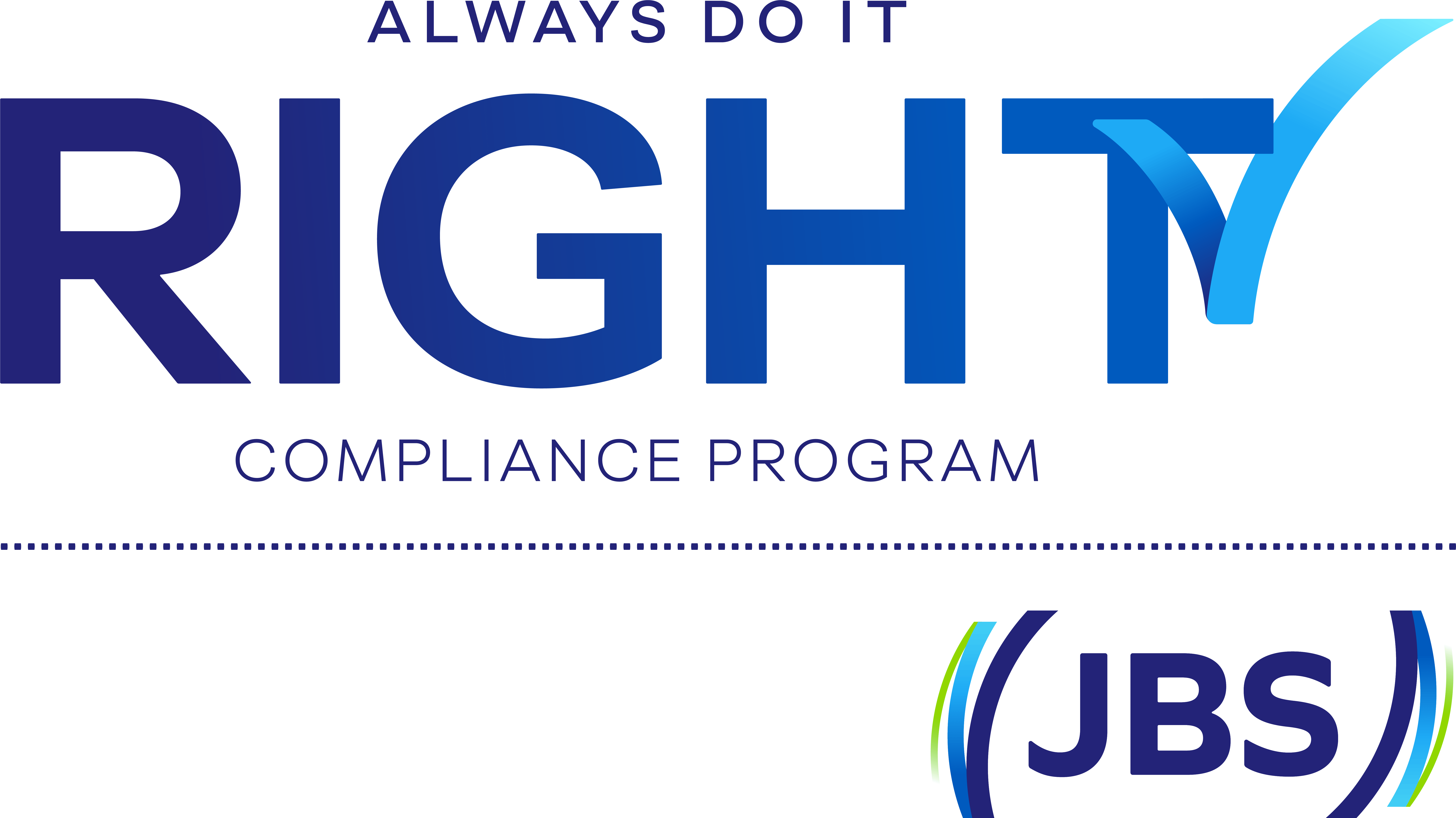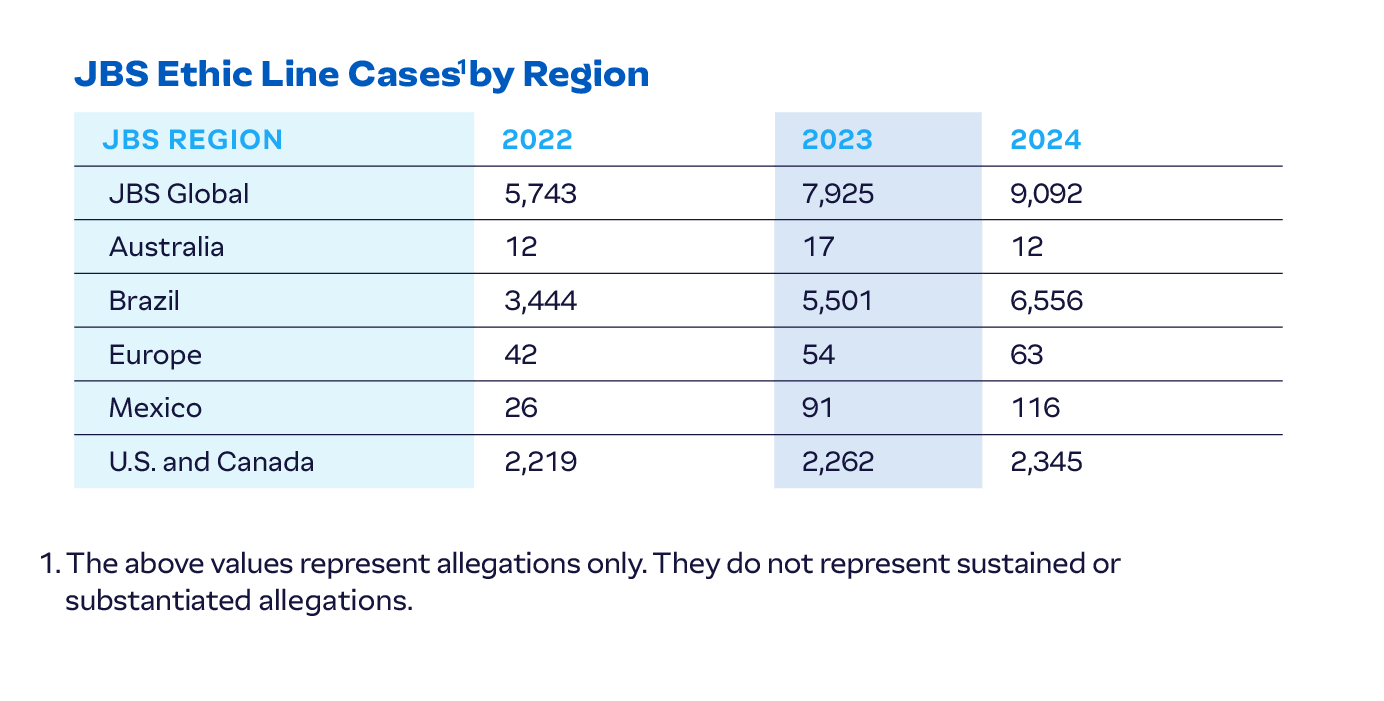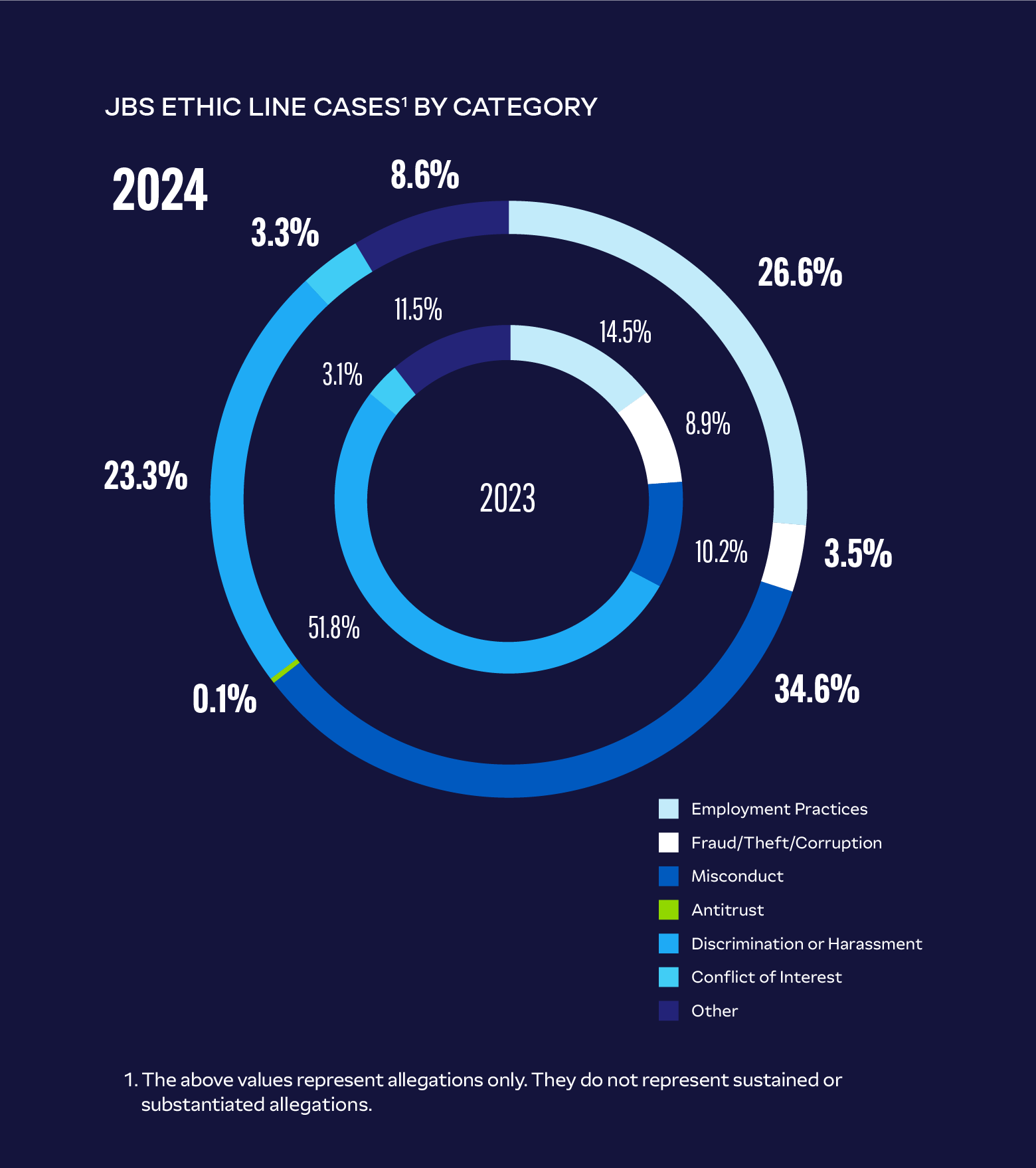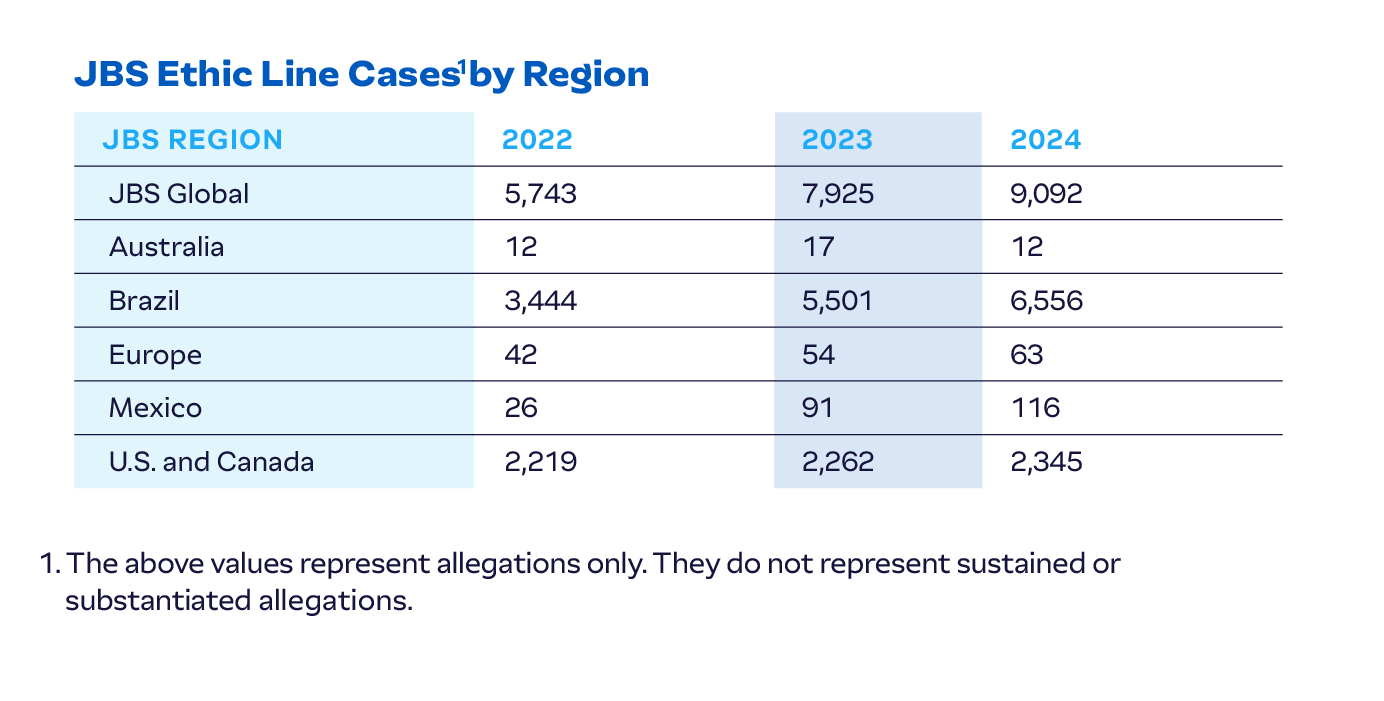Ethics and Compliance
(GRI 2-15, 2-25, 2-26, 2-27, 205-2, 205-3)
Ethical conduct is fundamental to maintaining the trust of our consumers, customers, investors, suppliers, team members, and other stakeholders, including government regulatory and enforcement agencies. Guided by a strong framework of compliance, integrity, and accountability, we adhere to applicable laws, policies, and regulations while fostering open communication across our organization and value chain.
JBS’s Global Chief Ethics and Compliance Officer, Mike Koenig, oversees the company’s global compliance program, which harmonizes regional frameworks and local expertise to ensure consistency across our global operations. Reporting directly to the Board of Directors, Mr. Koenig leads a team of six senior compliance managers representing JBS’s operational regions. Together, they drive the development and implementation of global policies and programs that promote ethical conduct in all business transactions and relationships.
Additionally, JBS senior compliance managers tailor procedures, programs, and strategies to address the specific needs of their regions while maintaining consistency with the overarching global compliance framework. For more information about our regional compliance initiatives, please visit our websites: Brazil, the U.S., Australia, Europe, Canada, and Mexico.

JBS requires all team members across every level of the organization to adhere to our Code of Conduct and Ethics (“Code”), which establishes clear behavioral standards to promote appropriate workplace conduct, safe operations, and the overall well-being of our team members.
All team members participate in annual training sessions delivered in-person, online, or via video, which include harassment prevention training and an overview of corrective actions for policy violations. Our harassment policy explicitly prohibits harassment and retaliation based on race, gender, age, religion, disability, or other protected characteristics. Violations of the Code or company policies may result in corrective actions such as coaching, written warnings, final written warnings, or termination of employment, underscoring our dedication to maintaining a respectful and compliant workplace.
Our Global Compliance Program
Our robust compliance framework is built on comprehensive policies, diligent oversight mechanisms, transparency, and accountability. This keeps ethical conduct embedded in our business activities and relationships.
At the core of our compliance program are global and regional policies, including Antibribery and Anticorruption, Antitrust, Non-Retaliation, Mergers and Acquisitions (“M&A”), Conflict of Interest, and Human Rights. These policies are reinforced by our Code and Business Associate Code of Conduct, which extend compliance expectations to our business partners. To further strengthen integrity in M&A, JBS has also implemented an M&A Anti-Corruption Due Diligence Procedure.
By adhering to industry standard guidelines, such as the U.S. Department of Justice’s Evaluation of Corporate Compliance Programs, we continuously evaluate and improve our compliance framework.

Our Nine Compliance Program Pillars
(GRI 2-15, 2-23)
JBS’s compliance program is built on nine foundational pillars, starting with strong support from senior management. To enhance the program, JBS leveraged guidance from the U.S. Department of Justice’s Evaluation of Corporate Compliance Programs, two international law firms, expert forensic firms, industry literature, and the expertise of its internal compliance team.
We maintain a robust compliance framework through our Global Executive Ethics and Compliance Committee, which promotes consistency across all JBS entities and regions. Comprised of executive leadership, the Committee develops global policies, oversees the ongoing structure and performance of the global compliance program, and promotes best practices. Both JBS and Pilgrim’s Boards of Directors mandate periodic reporting from Ethics and Compliance leaders, who now provide quarterly updates on compliance matters, including complaints received via the Ethics Line.
Regional oversight is reinforced through structured accountability mechanisms, including monthly meetings with all regional senior compliance leaders around the globe, monthly meetings between the Global Chief Ethics and Compliance Officer and the individual regional leaders, and quarterly Ethics Committee meetings in each region. Among other things, these committees, involving key leaders such as CEOs, CFOs, and heads of compliance, human resources, and legal departments, monitor performance for alignment with global policies on Antibribery, Non-Retaliation, Conflict of Interest, and Human Rights.
Senior management plays an active role in implementing the compliance program by participating in training, communicating priorities, and integrating compliance into daily operations. JBS compliance leaders regularly engage with team members, senior leaders, and business units through meetings, events, forums, and culture surveys to strengthen the company’s compliance culture.
To reinforce these standards, all team members complete annual mandatory training on the Code. New employees receive an employee handbook during orientation, which includes comprehensive information on ethics and compliance. Adherence to the Code is mandatory for all team members, and violations are addressed through corrective actions ranging from coaching to termination, depending on severity.
Some of the additional key policies and procedures we have implemented include:
- Global Anti-Bribery and Anti-Corruption Policy
- Global Conflict of Interest Policy
- Global Non-Retaliation Policy
- Antitrust Policy
- Ethics Line
- Gifts, Meals, and Entertainment
- Charitable Donations and Sponsorships
- Investigations
- Third-Party Due Diligence
JBS is dedicated to fostering a culture of integrity by providing accessible, secure, and retaliation-free channels for reporting concerns. The JBS Ethics Line serves as a cornerstone of this commitment, offering team members and external stakeholders a 24/7 platform to report potential violations anonymously if they choose. Available in 18 languages across all operating countries and managed by an independent third-party provider, the Ethics Line protects confidentiality while addressing issues related to JBS policies, procedures, laws, and regulatory requirements.
To encourage use, we actively promote the Ethics Line through our “Speak Up” campaign and regular communications throughout the organization. Reports submitted, whether by name or anonymously, are reviewed by the Ethics and Compliance team, which assigns investigations based on the nature of the allegations. Workplace-related cases are typically handled by Human Resources, while high-priority matters—such as antibribery, anticorruption, financial misconduct, and conflicts of interest—are directly managed by the Compliance team. In addition, allegations of any type involving senior leaders are also overseen by Compliance to maintain impartiality and thoroughness.
In 2024, 9,092 grievances were submitted to the Ethics Line, with approximately 7% classified as priority matters. All investigators undergo mandatory training before handling cases, which are subject to two levels of review to maintain rigor and accountability. Corrective actions, including administrative or disciplinary measures, were taken when warranted.



